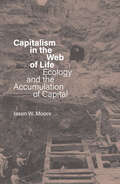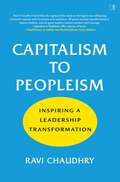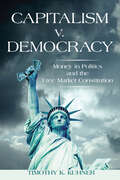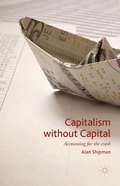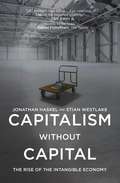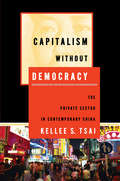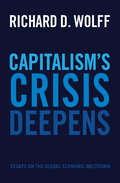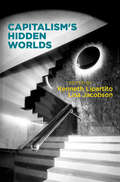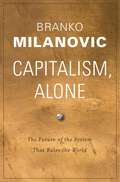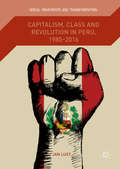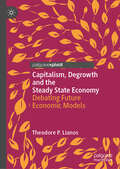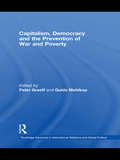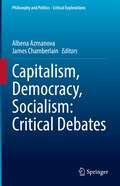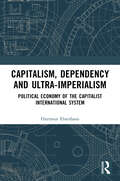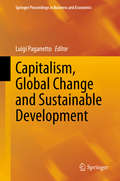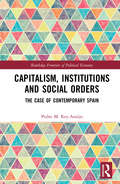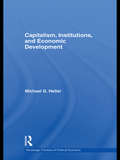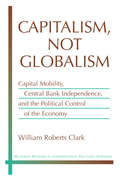- Table View
- List View
Capitalism in the Web of Life: Ecology and the Accumulation of Capital
by Jason W. MooreIntegrating both social and historical factors, this radical analysis of the development of capitalism reveals the ever-deepening relationship between capital and ecology Finance. Climate. Food. Work. How are the crises of the twenty-first century connected? In Capitalism in the Web of Life, Jason W. Moore argues that the sources of today&’s global turbulence have a common cause: capitalism as a way of organizing nature, including human nature. Drawing on environmentalist, feminist, and Marxist thought, Moore offers a groundbreaking new synthesis: capitalism as a &“world-ecology&” of wealth, power, and nature. Capitalism&’s greatest strength—and the source of its problems—is its capacity to create Cheap Natures: labor, food, energy, and raw materials. That capacity is now in question. Rethinking capitalism through the pulsing and renewing dialectic of humanity-in-nature, Moore takes readers on a journey from the rise of capitalism to the modern mosaic of crisis. Capitalism in the Web of Life shows how the critique of capitalism-in-nature—rather than capitalism and nature—is key to understanding our predicament, and to pursuing the politics of liberation in the century ahead.
Capitalism to Peopleism: Inspiring a Leadership Transformation
by Ravi ChaudhryOur world faces multiple existential challenges. The ways of doing business and governing nations are now dysfunctional and we are traversing the abyss to extinction. This book identifies a credible path to bypass this disaster. It is anchored on a leadership leap from &‘knowledge&’ to &‘wisdom&’, driven by political and business leaders manifesting key traits of awareness, bridge-building, and compassion. We are at a watershed moment in human history. While capitalism is unreformable and set for burial, capitalists (owners of capital) can flourish, provided they embrace the inescapable truism that the primacy of profit must make way for the predominance of people and the planet. This demands a paradigm shift from capitalism to Peopleism—a new system of governance that will nurture true democracy rooted in equity, sustainability, transparency, and justice.Capitalism to Peopleism is not just a game-changer; it is a new game-creator. It evolves the essential features of &‘an economics that works for all&’, emphasizing a growth strategy that discards the myth of &‘trickle-down&’ policies to unveil a &‘surge-up&’ development structure, not in incremental tweaks but through systemic transformation. The book invites you to &‘shape your future before it shapes you&’. It is a book that inspires and empowers everyone who aspires to live in a safer, happier world.
Capitalism v. Democracy: Money in Politics and the Free Market Constitution
by Timothy K. KuhnerAs of the latest national elections, it costs approximately $1 billion to become president, $10 million to become a Senator, and $1 million to become a Member of the House. High-priced campaigns, an elite class of donors and spenders, superPACs, and increasing corporate political power have become the new normal in American politics. In Capitalism v. Democracy, Timothy Kuhner explains how these conditions have corrupted American democracy, turning it into a system of rule that favors the wealthy and marginalizes ordinary citizens. Kuhner maintains that these conditions have corrupted capitalism as well, routing economic competition through political channels and allowing politically powerful companies to evade market forces. The Supreme Court has brought about both forms of corruption by striking down campaign finance reforms that limited the role of money in politics. Exposing the extreme economic worldview that pollutes constitutional interpretation, Kuhner shows how the Court became the architect of American plutocracy. Capitalism v. Democracy offers the key to understanding why corporations are now citizens, money is political speech, limits on corporate spending are a form of censorship, democracy is a free market, and political equality and democratic integrity are unconstitutional constraints on money in politics. Supreme Court opinions have dictated these conditions in the name of the Constitution, as though the Constitution itself required the privatization of democracy. Kuhner explores the reasons behind these opinions, reveals that they form a blueprint for free market democracy, and demonstrates that this design corrupts both politics and markets. He argues that nothing short of a constitutional amendment can set the necessary boundaries between capitalism and democracy.
Capitalism with Chinese Characteristics
by Yasheng HuangPresents a story of two Chinas - an entrepreneurial rural China and a state-controlled urban China. In the 1980s, rural China gained the upper hand. In the 1990s, urban China triumphed. In the 1990s, the Chinese state reversed many of its rural experiments, with long-lasting damage to the economy and society. A weak financial sector, income disparity, rising illiteracy, productivity slowdowns, and reduced personal income growth are the product of the capitalism with Chinese characteristics of the 1990s and beyond. While GDP grew quickly in both decades, the welfare implications of growth differed substantially. The book uses the emerging Indian miracle to debunk the widespread notion that democracy is automatically anti-growth. As the country marks its 30th anniversary of reforms in 2008, China faces some of its toughest economic challenges and substantial vulnerabilities that require fundamental institutional reforms.
Capitalism without Capital
by Alan ShipmanAn unusual consensus has developed among economists that the 'long boom' before 2008, and the subsequent crisis and recession, resulted from a global excess of capital. Over-supply of saving drive down capital costs, encouraging excessively risky investment and preventing the scrapping of outmoded plant. Capital's inexorable growth is also blamed for a prolonged squeeze on wages, rising elite wealth and worsening global inequality. This book explores the obvious clash between such argumentsand actual measurements of capital, which show a small and shrinking 'productive' component, and a deepening disconnection between capital accumulation and economic growth. It traces the conflict to the continued absence of consistent definitions or measurements of capital, and neglect of the complex connection between aggregate capital and wealth. Capital 'gains' and 'losses', and the growing domination of income statements by balance sheets, undermine attempts to sidestep the problem by reconstituting economics as a system of flows.
Capitalism without Capital: The Rise of the Intangible Economy
by Jonathan Haskel Stian WestlakeThe first comprehensive account of the growing dominance of the intangible economyEarly in the twenty-first century, a quiet revolution occurred. For the first time, the major developed economies began to invest more in intangible assets, like design, branding, R&D, and software, than in tangible assets, like machinery, buildings, and computers. For all sorts of businesses, from tech firms and pharma companies to coffee shops and gyms, the ability to deploy assets that one can neither see nor touch is increasingly the main source of long-term success.But this is not just a familiar story of the so-called new economy. Capitalism without Capital shows that the growing importance of intangible assets has also played a role in some of the big economic changes of the last decade. The rise of intangible investment is, Jonathan Haskel and Stian Westlake argue, an underappreciated cause of phenomena from economic inequality to stagnating productivity.Haskel and Westlake bring together a decade of research on how to measure intangible investment and its impact on national accounts, showing the amount different countries invest in intangibles, how this has changed over time, and the latest thinking on how to assess this. They explore the unusual economic characteristics of intangible investment, and discuss how these features make an intangible-rich economy fundamentally different from one based on tangibles.Capitalism without Capital concludes by presenting three possible scenarios for what the future of an intangible world might be like, and by outlining how managers, investors, and policymakers can exploit the characteristics of an intangible age to grow their businesses, portfolios, and economies.
Capitalism without Democracy: The Private Sector in Contemporary China
by Kellee S. TsaiOver the past three decades, China has undergone a historic transformation. Once illegal, its private business sector now comprises 30 million businesses employing more than 200 million people and accounting for half of China's Gross Domestic Product. Yet despite the optimistic predictions of political observers and global business leaders, the triumph of capitalism has not led to substantial democratic reforms. In Capitalism without Democracy, Kellee S. Tsai focuses on the activities and aspirations of the private entrepreneurs who are driving China's economic growth. The famous images from 1989 of China's new capitalists supporting the students in Tiananmen Square are, Tsai finds, outdated and misleading. Chinese entrepreneurs are not agitating for democracy. Most are working eighteen-hour days to stay in business, while others are saving for their one child's education or planning to leave the country. Many are Communist Party members. "Remarkably," Tsai writes, "most entrepreneurs feel that the system generally works for them." Tsai regards the quotidian activities of Chinese entrepreneurs as subtler and possibly more effective than voting, lobbying, and protesting in the streets. Indeed, major reforms in China's formal institutions have enhanced the private sector's legitimacy and security in the absence of mobilization by business owners. In discreet collaboration with local officials, entrepreneurs have created a range of adaptive informal institutions, which in turn, have fundamentally altered China's political and regulatory landscape. Based on years of research, hundreds of field interviews, and a sweeping nationwide survey of private entrepreneurs funded by the National Science Foundation, Capitalism without Democracy explodes the conventional wisdom about the relationship between economic liberalism and political freedom.
Capitalism's Crisis Deepens: Essays on the Global Economic Meltdown
by Richard D. WolffPraise for Richard Wolff and Democracy at Work:"Richard Wolff's constructive and innovative ideas suggest new and promising foundations for much more authentic democracy and sustainable and equitable development, ideas that can be implemented directly and carried forward. A very valuable contribution in troubled times."--Noam Chomsky"Richard Wolff is the leading socialist economist in the country. This book is required reading for anyone concerned about a fundamental transformation of the ailing capitalist economy!"--Cornel West"Bold, thoughtful, transformative-a powerful and challenging vision that takes us beyond both corporate capitalism and state socialism. Richard Wolff at his best!"--Gar AlperovitzWhile most mainstream commentators view the crisis that provoked the Great Recession as having passed, these essays from Richard Wolff paint a far less rosy picture. Drawing attention to the extreme downturn in most of capitalism's old centers, the unequal growth in its new centers, and the resurgence of a global speculative bubble, Wolff--in his uniquely accessible style--makes the case that the crisis should be grasped not as a passing moment, but as an evolving stage in capitalism's history.Richard Wolff is Professor of Economics Emeritus, University of Massachusetts, Amherst, and a Visiting Professor at the New School in New York. Wolff's recent work has concentrated on analyzing the causes and alternative solutions to the global economic crisis. His groundbreaking book Democracy at Work: A Cure for Capitalism inspired the creation of Democracy at Work, a nonprofit organization dedicated to showing how and why to make democratic workplaces real.
Capitalism's Eye: Cultural Spaces of the Commodity (Cultural Spaces)
by Kevin HetheringtonCapitalism's Eye is an extremely ambitious cultural history of how people experienced commodities in the era of industrial expansion. Writing against the dominant argument that the 'society of the spectacle' emerged fully formed in the mid-nineteenth century, Kevin Hetherington explains that the emergence of a culture of mass consumption dominated by visual experience was a much slower process, not truly ascendant until after the First World War. Looking at the department stores, home life, and the great exhibitions around the turn of the last century, Capitalism's Eye promises to transform how we understand both the cultural history of capitalism in America and Europe and the historical roots of the mediated spectacle that dominates our world today.
Capitalism's Hidden Worlds (Hagley Perspectives on Business and Culture)
by Lisa Jacobson Kenneth LipartitoA dynamic social history of shadow capitalism spanning the late nineteenth and twentieth centuriesObservers see free markets, the relentless pursuit of profit, and the unremitting drive to commodify everything as capitalism's defining characteristics. These most visible economic features, however, obscure a range of other less evident, often unmeasured activities that occur on the margins and in the concealed corners of the formal economy. The range of practices in this large and diverse hidden realm encompasses traders in recycled materials and the architects of junk bonds and shadow banking. It includes the black and semi-licit markets that allow wealthy elites to avoid taxes and the unmeasured domestic and emotional labor of homemakers and home care workers. By some estimates, the unmeasured economic activity that occurs within the household, informal market, and underground economy amounts to a substantial portion of all economic activity in the world, as much as 30 percent in some countries.Capitalism's Hidden Worlds sheds new light on this shadowy economic landscape by reexamining how we think about the market. In particular, it scrutinizes the missed connections between the official, visible realm of exchange and the uncounted and invisible sectors that border it. While some hidden markets emerged in opposition to the formal economy, much of the obscured economy described in this volume operates as the other side of the legitimate, state-sanctioned marketplace. A variety of historical actors—from fortune tellers and forgers to tax lawyers and black market consumers—have constructed this unseen world in tandem with the observable public world of transactions. Others, such as feminist development economists and government regulators, have worked to bring the darkened corners of the economy to light. The essays in Capitalism's Hidden Worlds explore how the capitalist marketplace sustains itself, how it acquires legitimacy and even prestige, and how the marginalized and the dispossessed find ways to make ends meet.Contributors: Bruce Baker, Eileen Boris, Eli Cook, Hannah Frydman, James Hollis, Owen Hyman, Anna Kushkova, Christopher McKenna, Kenneth Mouré, Philip Scranton, Bryan Turo.
Capitalism, Alone: The Future of the System That Rules the World
by Branko MilanovicFor the first time in history, the globe is dominated by one economic system. Capitalism prevails because it delivers prosperity and meets desires for autonomy. But it also is unstable and morally defective. Surveying the varieties and futures of capitalism, Branko Milanovic offers creative solutions to improve a system that isn’t going anywhere.
Capitalism, Class and Revolution in Peru, 1980-2016 (Social Movements and Transformation)
by Jan LustIn an analysis of political, economic, and social development in Peru in the years between 1980 and 2016, this book explores the failure of the socialist Left to realize its project of revolutionary social transformation. Based on extensive interviews with leading cadres in the struggle for revolutionary change and a profound review of documents from the principal socialist organizations of the 1980s and 1990s, the volume reveals that the socialist Left did not fully comprehend the deep political and social implications of changes to the country’s class structures. As such, the Left failed to develop and implement adequate strategic and tactical responses to the processes that eroded its political and social bases in the 1980s and 1990s, ultimately leading to its loss of social and political power. Lust concludes that the continued political and organizational agony of the Peruvian socialist Left and the hegemony of neoliberalism in society is a product of the dialectical interplay between the objective and subjective conditions that determine Peruvian capitalist development.
Capitalism, Communism and Coexistence: From the Bitter Past to a Better Prospect
by John Kenneth Galbraith Stanislav MenshikovA medley of essays deliberating on socialism and communism and the question of whether a mutual coexistence of the two is in fact possible. As told through the eyes of Galbraith and Menshikov from the grounds of their mutual respect and friendship.
Capitalism, Corporations and the Social Contract
by Samuel F. MansellIn whose interests should a corporation be run? Over the last thirty years the field of 'stakeholder theory' has proposed a distinctive answer: a corporation should be run in the interests of all its primary stakeholders - including employees, customers, suppliers and financiers - without contradicting the ethical principles on which capitalism stands. This book offers a critique of this central claim. It argues that by applying the political concept of a 'social contract' to the corporation, stakeholder theory in fact undermines the principles on which a market economy is based. The argument builds upon an extensive review of the stakeholder literature and an analysis of its philosophical foundations, particularly concerning the social contract tradition of John Rawls and his predecessors. The book concludes by offering a qualified version of Milton Friedman's shareholder theory as a more justifiable account of the purpose of a corporation.
Capitalism, Degrowth and the Steady State Economy: Debating Future Economic Models (Palgrave Insights into Apocalypse Economics)
by Theodore P. LianosThis book examines the contemporary state of the capitalist economyand its future trajectory in a world characterized by multiple crises from population growth to ecological damage. Setting an understanding of modern capitalism in global historical context, chapters consider the uncertainty of capitalism’s future and argues that capitalism must adapt dramatically to survive.. The book examines the major problems that a capitalist system faces, including inequality, organized crime, uncontrolled technological development, polarizing geopolitics, food security and climate change. To address these multifaceted challenges andminimize the impact of capitalism in exacerbating them, the book discusses the potential viability of a ‘steady state’ economic model and a de-growth approach to the global economy. It also considers various alternative models for the future, including eco-socialism and participatory socialism. This book deftly weaves together perspectives on a wide variety of issues and will be a useful resource for scholars interested in Marxist economics and heterodox economics, political economy, economic development and economic thought.
Capitalism, Democracy and the Prevention of War and Poverty (Routledge Advances in International Relations and Global Politics #Vol. 69)
by Peter Graeff Guido MehlkopFor a very large part of the world’s population, poverty and war are still part of everyday life. Drawing on insights from several disciplines, this book attempts to find scientific answers to explain the relationship between conflict and poverty. This interdisciplinary volume brings together a range of arguments that synthesize both democratic and capitalist peace theory. Supported by a large body of research, contributors contend that nations with institutions that maximize individual political and civil rights minimize the probability of fighting each other. The volume includes: contributors from leading and award winning scholars in the field, including Bruce Russett and Erik Gartzke topics such as democratization and economic development, situated within the broader contexts of globalization and modernization contributions supported by empirical analyses, systematizing democratic and capitalist peace theories This book will be vital reading for students and scholars of International Relations and globalization, and also for a broader range of subjects including sociology, political science and economics.
Capitalism, Democracy, Socialism: Critical Debates (Philosophy and Politics - Critical Explorations #22)
by Albena Azmanova James ChamberlainThis book critically analyzes the current historical conjuncture of neoliberal capitalism with an eye to its emergent alternatives. Can democracy and capitalism thrive together? Is socialism a viable and a desirable alternative? What are the forms of emancipatory action and critical thought that can effectively chart a way forward? Focusing on nine “critical debates” it provides a uniquely comprehensive overview of the tensions, contradictions, and latent emancipatory potential of contemporary global capitalism. The specific debates are as follows: capitalism’s relationship with democracy; privatization and governance of the commons; the financialization of capitalism; technology and the future of work; varieties of neoliberal capitalism; cosmopolitanism, international development, and human rights; feminist theory and social solidarity; sustainability and climate change; and theories of capitalist crisis.
Capitalism, Dependency and Ultra-Imperialism: Political Economy of the Capitalist International System
by Hartmut ElsenhansThis book assembles main contributions to an alternative explanation of globalisation and the political economic structures of the international system. As the result of capitalism, globalisation does not transfer basic capitalist structures from the Centre to the Periphery. Capitalism is based on rising mass incomes that create investment opportunities and, thus, the possibility of profit. A structurally homogeneous and ultraimperialist Centre dominates a deeply fissured Periphery of structurally heterogeneous societies and economies. Capitalism penetrates underdeveloped regions and deforms them through rent, which obstructs expanding internal mass markets while labour goes unempowered. Rent constitutes the basis for state operations and the role of emerging state classes. While globalisation disempowers labour in both the West and in the South, it has given new comparative advantage to the South. The shift from rent appropriation in the South via raw material exports to export-led manufacturing is based on devaluation below purchasing power parity and, hence, on a rent from agriculture that is based on the Green Revolution. Its impact is, however, not always sufficient to compensate for the loss of influence experienced by social reformist forces. A novel multipolar system based on the balance power has emerged. Mutliethnic empires are held together with large varieties of however always identitarian ideologies. This global system is composed of powers that are internally and externally opposed to peaceful change. Across the globe, there is an impending danger of globalisation of rent. Print edition not for sale in South Asia (India, Sri Lanka, Nepal, Bangladesh, Pakistan and Bhutan)
Capitalism, Development and Empowerment of Labour: A Heterodox Political Economy (Routledge Frontiers of Political Economy)
by Hartmut ElsenhansThe dominant neoliberal approach presents politics and political economy as nuisances which disturb the smooth operation of self-regulating markets. But political economy is not merely an academic issue – it is a class issue, and this book forcefully argues that political economy should return to a central position in the study of the social sciences. Offering nothing less than a reconciliation of Marxian, Keynesian and neoclassical economics, the work opens with a discussion of the key, interconnected economic concepts which help us to understand capitalism: price, income, profit, value, growth and crisis. Prices reflect income distribution and therefore class relations, and the chapters show that the very emergence of capitalism resulted from mass empowerment of the so-called "lower orders". Profit is always available if entrepreneurs spend on net investment and create incomes for additional labour; this, in turn, requires expanding demand, and so therefore profit depends on rising mass incomes. Conversely, underdevelopment is the result of the destitution and disempowerment of the masses. In the Global South today, it is clear that enormous riches go hand in hand with widespread misery and poverty because the market does not transform wealth into the kind of investment that might benefit all. This book argues that the new wealth triggered by productivity increases has enabled the rich to liberate themselves from the capitalist constraints of competition and waste their new wealth in the form of rents. The main threat today is, in fact, the globalisation of rent. The text makes a point for a progressive counter strategy: capitalist structures that empower labour need to be transferred to the Global South. This requires political and economic efforts towards empowering labour in the Global South. This book demonstrates the analytical power of political economy for all social scientists and will be invaluable reading for economists, political scientists and sociologists in particular.
Capitalism, For and Against: A Feminist Debate
by Ann E. Cudd Nancy HolmstromPolitical philosophy and feminist theory have rarely examined in detail how capitalism affects the lives of women. Ann Cudd and Nancy Holmstrom take up opposing sides of the issue, debating whether capitalism is valuable as an ideal and whether as an actually existing economic system it is good for women. In a discussion covering a broad range of social and economic issues, including unequal pay, industrial reforms and sweatshops, they examine how these and other issues relate to women and how effectively to analyze what constitutes 'capitalism' and 'women's interests'. Each author also responds to the opposing arguments, providing a thorough debate of the topics covered. The resulting volume will interest a wide range of readers in philosophy, political theory, women's studies and global affairs.
Capitalism, Global Change and Sustainable Development (Springer Proceedings in Business and Economics)
by Luigi PaganettoThis book analyzes new forms of capitalism that are manifesting under the pressures of global transformation. By studying economic and environmental indicators in various parts of the world, it seeks to reconcile economic growth with environmental and social sustainability, which is an important issue in both developed and emerging economies. These indicators include the explosive development of digital technologies and new global value chains, which are reshaping economies and societies all over the world. The contributing authors also address the challenge of immigration, the sustainable development transformation, the ties between productivity and social rights, automation and global value chains, the energy transition, and innovation and sustainable growth.
Capitalism, God, and a Good Cigar: Cuba Enters the Twenty-First Century
by Lydia ChávezWhen the Soviet Union dissolved, so did the easy credit, cheap oil, and subsidies it had provided to Cuba. The bottom fell out of the Cuban economy, and many expected that Castro's revolution--the one that had inspired the Left throughout Latin America and elsewhere--would soon be gone as well. More than a decade later, the revolution lives on, albeit in a modified form. Following the collapse of Soviet communism, Castro legalized the dollar, opened the island to tourism, and allowed foreign investment, small-scale private enterprise, and remittances from exiles in Miami. Capitalism, God, and a Good Cigar describes what the changes implemented since the early 1990s have meant for ordinary Cubans: hotel workers, teachers, priests, factory workers, rap artists, writers, homemakers, and others. Based on reporting by journalists, writers, and documentary filmmakers since 2001, each of the essays collected here covers a particular dimension of contemporary Cuban society, revealing what it is like to have lived, for more than a decade, suspended between communism and capitalism. There are pieces on hip hop musicians, fiction writing and censorship, the state of ballet and the performing arts, and the role of computers and the Internet. Other essays address the shrinking yet still sizeable numbers of true believers in the promise of socialist revolution, the legendary cigar industry, the changing state of religion, the significance of the recent influx of money and people from Spain, and the tensions between recent Cuban emigrants and previous generations of exiles. Including more than seventy striking documentary photographs of Cuba's people, countryside, and city streets, this richly illustrated collection offers keen, even-handed insights into the abundant ironies of life in Cuba today. Contributors. Juliana Barbassa, Ana Campoy, Mimi Chakarova, Lydia Chvez, John Cot, Julian Foley, Angel Gonzlez, Megan Lardner, Ezequiel Minaya, Daniela Mohor, Archana Pyati, Alicia Roca, Olga R. Rodrguez, Bret Sigler, Annelise Wunderlich
Capitalism, Institutions and Social Orders: The Case of Contemporary Spain (Routledge Frontiers of Political Economy)
by Pedro M. Rey-AraújoCapitalism, Institutions and Social Orders develops a novel political economy approach by establishing a dialogue between the Social Structures of Accumulation (SSA) theory and Ernesto Laclau’s post-Marxism theory. Using this synthesis, it provides an in-depth analysis of Spain’s recent socio-economic evolution since the early 1990s. The book develops a theoretical framework capable of appraising capitalist dynamics together with their relationship to the institutional environment surrounding and structuring them. This is in order to explore the interrelation between the historical development of the capitalist mode of production, on the one hand, and the various co-existing social processes, social consensuses and political identities, on the other. Contemporary Spain provides an interesting case study: until the onset of the Great Recession, Spain had an impressive macroeconomic record supported by several contradictory social processes, such as a massive real estate bubble, an upsurge in private indebtedness and a deteriorating manufacturing sector. However, the accumulation of internal imbalances during those years led inevitably to the sudden disintegration of this institutional and social environment in the years after 2008, thus resulting into a breakdown of capitalist activity accompanied by widespread social contestation. The book also explores the ensuing political scenario, including the emergence of the ‘indignados’ movement and the anti-austerity party Podemos. This work is of significant interest to critical political economy and discourse-theory scholars, critical theorists in general, and social scientists concerned with the recent Spanish experience.
Capitalism, Institutions, and Economic Development (Routledge Frontiers of Political Economy)
by Michael G. HellerBased on a timely reassessment of the classic arguments of Weber, Schumpeter, Hayek, Popper, and Parsons, this book reconceptualizes actually-existing capitalism. It proposes capitalism as an impersonal procedural solution to the problems of spontaneously coordinating public institutions that enable durable market-based wealth generation and social order. Few countries have achieved this. A novel contribution of the book is that it identifies a practical sequence of economic and institutional shortcuts to real capitalism. The book challenges current orthodoxies about varieties of capitalism and relativist recipes for economic growth, and it criticizes culturalist and incrementalist viewpoints in institutional economics. It calls on the social sciences to help in constructing dynamic and prosperous open societies of the twenty-first century by reclaiming older ideas of ‘social economics’. Better and faster solutions will emphasize crisis-induced change, rational leadership, ideological persuasion, institutional engineering, rules-based market freedom, and the universalistic formal-procedural impersonality of optimal regulatory systems.
Capitalism, Not Globalism
by William Roberts ClarkCapitalism, Not Globalism shows that, while much has been made of recent changes in the international economy, the mechanisms by which politicians control the economy have not changed throughout the postwar period. Challenging both traditional and revisionist globalization theorists, William Roberts Clark argues that increased financial integration has led to neither a widening nor a narrowing of partisan differences in macroeconomic polices or outcomes. Rather, he shows that the absence of partisan differences in macroeconomic policy is a long-standing feature of democratic capitalist societies that can be traced to politicians' attempts to use the economy to help them survive in office. Changes in the structural landscape such as increased capital mobility and central bank independence do not necessarily diminish the ability of politicians to control the economy, but they do shape the strategies they use to do so. In a world of highly mobile capital, politicians manipulate monetary policy to create macroeconomic expansions prior to elections only if the exchange rate is flexible and the central bank is subservient. But they use fiscal policy to induce political business cycles when the exchange rate is fixed or the central bank is independent. William Roberts Clark is Assistant Professor, Department of Politics, New York University.
